Hardly a day has gone by in 2016 without headlines about turmoil in the world’s financial markets and struggling economies. High on the list of concerns: plunging oil prices, erratic stock markets, the slowdown in China, a rising dollar and a possible U.S. recession. Yet these days, it’s not just brokers on Wall Street who have their heads in their hands but also those in the New York City real estate market.
Welcome to the realities of the global economy.
Adapting to the new global age, developers have in recent years aggressively courted wealthy buyers from Canada, Norway, Asia, the Middle East and Russia. It’s no secret that foreign buyers are largely to thank for the luxury condo bull market that has given way to Billionaires’ Row. Even today, the developer that started the trend, Extell Development, is marketing its planned Lower East Side condo tower, One Manhattan Square, exclusively to Asian buyers.
The impact is indisputable in the commercial sector, where foreign investors had a hand in $27.7 billion worth of deals in Manhattan in 2015 alone — 35 percent of all transactions — according to Real Capital Analytics. And that figure doesn’t count foreign lending and all the foreign capital that has flown into U.S. real estate investment trusts or private real estate funds.
But the flipside (or dark side, if you prefer) of globalization is that it ties the fate of NYC real estate to far-flung regions around the world, and with that, the political and financial crises that inevitably arise far, far away from New York.
“I think it’s something you have to watch carefully,” said RXR Realty CEO Scott Rechler. “We’re not immune to it.”
Indeed, although many veteran market players argue that New York real estate will serve as a safe haven for foreign investors, Adam Kamins, an economist at Moody’s Analytics, called it “a little bit naïve” to assume that global upheaval is no big deal for New York real estate.
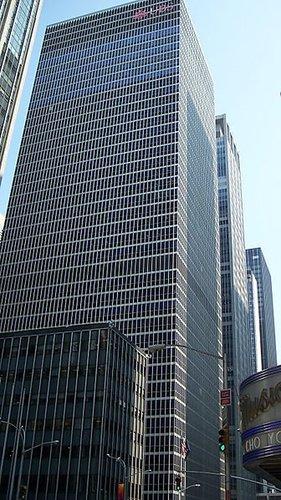
1285 Avenue of the Americas
“If there’s a big enough shock to the economy and global wealth decreases, the potential pool of buyers decreases,” he said.
But as always, there are caveats. Some, like Rechler, believe that the potential impact on New York real estate will depend on the type of asset. RXR recently went into contract to buy an office tower at 1285 Avenue of the Americas for $1.7 billion. Given the market jitters, it’s a bold buy. But Rechler is confident that trophy properties like his will perform well as long as buyers don’t overpay.
“For core assets, flight to safety is sustaining that investment market and we haven’t seen the slowdown,” he said. “When you get to more value-add and transition-type assets, people are taking a step back.”
This month, The Real Deal broke down the global and domestic issues economists are closely following — and explored the potential fallout for the NYC real estate market. Consider it a Global Econ 101 primer.
The dragon economy loses its fire
 After a two-decade boom, China’s economy is finally slowing down. The International Monetary Fund expects the country’s gross domestic product to grow by 6.3 percent in 2016. The rate is nothing to sneeze at — the U.S. is growing at less than 3 percent annually. But it’s a worrying drop-off for one of the world’s biggest economies. The average annual growth rate in China between 1989 and 2015 was close to 10 percent annually. Starting in August, Chinese government officials began devaluing the currency, triggering panic in the global markets and suggesting signs of broader economic weakness in the country. Those factors, combined with a high level of debt in China’s banking sector, have raised concerns that more trouble could lie ahead.
After a two-decade boom, China’s economy is finally slowing down. The International Monetary Fund expects the country’s gross domestic product to grow by 6.3 percent in 2016. The rate is nothing to sneeze at — the U.S. is growing at less than 3 percent annually. But it’s a worrying drop-off for one of the world’s biggest economies. The average annual growth rate in China between 1989 and 2015 was close to 10 percent annually. Starting in August, Chinese government officials began devaluing the currency, triggering panic in the global markets and suggesting signs of broader economic weakness in the country. Those factors, combined with a high level of debt in China’s banking sector, have raised concerns that more trouble could lie ahead.
At an Urban Land Institute forum in late January, Related Companies’ Jeff Blau said Chinese lenders were noticeably absent when the firm was looking to refinance the firm’s first Hudson Yards tower. “We got probably 10 bids to recap, but no Chinese,” he told the audience.
And, he said, the New York real estate world should look elsewhere for investors because the Chinese government has already signaled plans to curtail outbound capital.
Still, some real estate finance experts are urging the industry to remain calm.
“I think China is going to continue to be a huge player in the market,” said Ronald Dickerman, president of real estate private equity firm Madison International Realty, whose funds invest in and attract capital from around the globe, including Asia.
He argued that the Chinese government appears to have sufficient control over the country’s markets, in part through its sway over state-owned companies and lenders.
Some also argue that all of this concern about China is overblown when it comes to New York real estate. The numbers suggest that a moderate downturn in China should not by itself be enough to significantly harm New York City’s real estate market. Because although Chinese investors had a hand in $5.4 billion worth of Manhattan commercial real estate deals in 2015, according to Real Capital Analytics — which included splashy buys like Anbang Insurance Group’s $1.95 billion purchase of the Waldorf Astoria Hotel — that amounted to a mere 7 percent of the market. (According to JLL, Chinese investment, including that of Hong Kong, figured as high as $8.6 billion.)
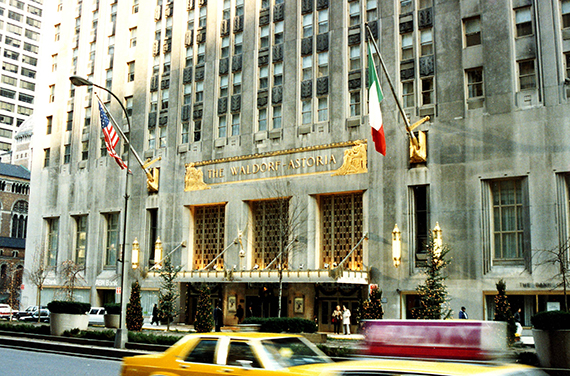
The Waldorf-Astoria Hotel
“New York is the world capital of investment flow. You’ve got capital flowing in from [everywhere],” said John Liang, executive vice president at development firm Xinyuan Real Estate. “Chinese investment, especially institutional investment, is still pretty negligible.”
Liang — whose firm developed the Oosten condo in Williamsburg and is planning its first condo project in Hell’s Kitchen — dismissed the suggestion that Chinese investment is on the decline. “I think the interest has always been there and is not decreasing,” he said. “I do think it’s still on the upward trend.”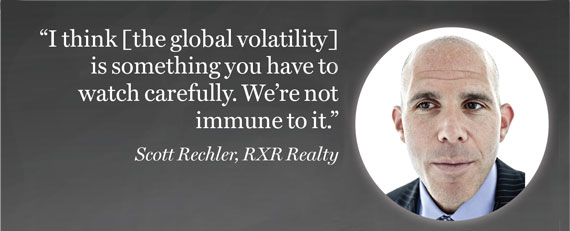 And in the short term, there could be more Chinese cash buyers as a result of China’s economic uncertainty. Bloomberg News recently estimated that capital outflows from China in 2015 totaled $1 trillion. Chinese citizens with money in the bank are moving cash abroad at high rates amid concerns over the Chinese economy and fears that the yuan could be devalued further. Coupled with the government lowering interest rates in an attempt to stimulate the economy, the urgency to get money out of China has never been greater. In a practice known as “smurfing,” Chinese citizens have been moving large sums abroad by sending dozens of friends or family members across the border with $50,000 in cash each as a way to get around the country’s legal transfer limit.
And in the short term, there could be more Chinese cash buyers as a result of China’s economic uncertainty. Bloomberg News recently estimated that capital outflows from China in 2015 totaled $1 trillion. Chinese citizens with money in the bank are moving cash abroad at high rates amid concerns over the Chinese economy and fears that the yuan could be devalued further. Coupled with the government lowering interest rates in an attempt to stimulate the economy, the urgency to get money out of China has never been greater. In a practice known as “smurfing,” Chinese citizens have been moving large sums abroad by sending dozens of friends or family members across the border with $50,000 in cash each as a way to get around the country’s legal transfer limit.
“It’s sort of ‘now or never,’” said Jacob Kirkegaard, a senior fellow at the Washington, D.C.-based Peterson Institute for International Economics.
One clear beneficiary of Chinese capital flight is likely to be U.S. real estate. In 2015, Chinese families became the largest group of overseas homebuyers in the U.S.
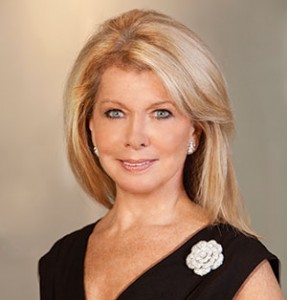
Nikki Field
Nikki Field, a top residential broker at Sotheby’s International Realty, said almost half her clients in 2015 were Chinese. While she said Chinese buyers are still “very active” in the New York market, more of that activity is taking place at lower price points rather than in the ultra-luxury market.
“Pricing at value will be the magic word for the next few months,” she said, explaining that Chinese buyers have become more cost-conscious.
However, since bargains are hard to come by in Manhattan, some Chinese buyers may flock to other cities. “I don’t think the appetite will slow down,” Field said. “I think the volume of buyers will continue to grow — but perhaps not in New York.”
Oil-backed economies sputter
In case you haven’t noticed, oil is cheap these days — and it’s making everybody worried. The price of a barrel of Brent crude oil was at $32 in the middle of last month — down from $113 in June 2014. In the past, markets would cheer that kind of slide. But not in 2016. While lower oil prices may be good for U.S. consumers’ wallets, early indications suggest that consumers are not spending all of the extra pocket cash — meaning there is less of a boost to the economy.
Economists are also worried about how the drop in oil prices will negatively impact oil-producing countries around the world and shale drillers in the U.S.
In terms of real estate, cheap oil is good news for multifamily landlords, who often pay through the nose to heat their buildings.
 “The vast majority of apartment buildings are materially impacted by reduced oil and gas prices and lower heating expenses,” said Daniel Parker, a senior vice president at investment sales brokerage Hodges Ward Elliott. “Cheaper fuel and a mild winter allowed landlords to stabilize their net operating incomes while dealing with the rent freeze.” Parker estimated that heating can account for 20 percent of all expenses, including taxes, for owners of non-luxury buildings.
“The vast majority of apartment buildings are materially impacted by reduced oil and gas prices and lower heating expenses,” said Daniel Parker, a senior vice president at investment sales brokerage Hodges Ward Elliott. “Cheaper fuel and a mild winter allowed landlords to stabilize their net operating incomes while dealing with the rent freeze.” Parker estimated that heating can account for 20 percent of all expenses, including taxes, for owners of non-luxury buildings.
But at the same time, cheap oil does not bode well for New York’s investment sales market — and that has far more worrying implications on the industry.
Over the years, oil-rich countries have bought up big stakes in Manhattan’s commercial market.
Qatar Investment Authority recently bought a 44 percent stake of Brookfield’s $8.6 billion mixed-use project Manhattan West while the Abu Dhabi Investment Authority bought two Manhattan hotels for more than $700 million in 2015.
Some observers fear that low oil prices and resulting budget deficits could mean Middle Eastern sovereign wealth funds will have less cash to invest in New York.
Early last month, Reuters reported that the Abu Dhabi fund may transfer as much as $27 billion from its sovereign wealth fund into the government treasury. The fund’s head of U.S. real estate investment, Tom Arnold, dismissed the suggestion that investment could dry up but cryptically alluded to “anxiety” within the fund about the state of the market.
Overall, however, oil-rich countries, including Norway, Abu Dhabi and Qatar, accounted for less than 15 percent of foreign investment in the New York commercial market last year.
So while a pullback from those countries would obviously not be good news for New York, it would also not likely create an enormous hole in the market. Moreover, weakness in oil-rich countries could actually push investment into New York. “Some investors may be cutting back because of the decline in oil profits, but we’re seeing a lot of money coming out of the Middle East because they want to invest outside of the region,” said Howard Michaels, CEO of the Carlton Group.
Perhaps more concerning for New York commercial real estate is how Canada will respond. The country was the single biggest foreign investor in New York real estate in 2015, accounting for 35 percent of all foreign investment. But its economy, which is heavily reliant on its energy sector, is also struggling. After six months of negative growth, Canada’s GDP edged up just 0.6 percent in the third quarter of 2015.
Other oil-based economies are reacting, too. In the case of Russia, Vlad Sapozhnikov, whose Manhattan-based firm One World Property Advisors works with investors from Eastern Europe and Central Asia, said he has noticed a sharp drop in investment in part because of Western economic sanctions in the wake of the country’s invasion of Ukraine. His Russian clients are currently “just sitting tight,” he said.
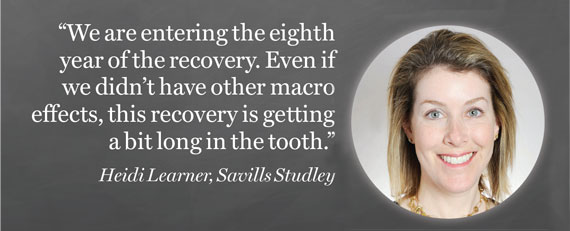 Similarly, Richard Jordan, senior vice president of global markets at Douglas Elliman, said he’s “definitely seen a slowdown in interest from Russian and Brazilian markets.”
Similarly, Richard Jordan, senior vice president of global markets at Douglas Elliman, said he’s “definitely seen a slowdown in interest from Russian and Brazilian markets.”
Russian buyers, of course, drew a lot of attention for making high-profile trophy purchases in the residential market earlier in this last boom. Ed Mermelstein, a partner at law firm RheemBell & Mermelstein LLP, said buyers from the former Soviet Union are increasingly switching to income-producing assets.
“In the last six months to a year, the trend shifted from high-end residential to investment properties,” he said, explaining that buyers are increasingly looking to squeeze cash from properties as other sources of income dry up. “Most of the money that was being made in that part of the world had been connected to commodities, oil and gas. That part of the market has to a large extent collapsed.”
But statistically speaking, Russians never made up a big block of the residential market. As a result, sources said, their absence is not that problematic.
A bigger concern than both the Russian retreat and the pullback from oil-rich countries, is the weakness in the U.S. shale oil industry, which could lead to defaults by shale companies on business loans. That would hit banks and could, in turn, force tighter lending conditions that would have a spillover effect on the real estate industry.
“That’s a fair concern that perhaps banks haven’t set aside enough low-risk reserves for loans to energy companies,” said Heidi Learner, chief economist at Savills Studley.
Eight major U.S. banks alone, including the likes of Wells Fargo and Bank of America, have lent $93 billion to the energy sector, according to CNBC.
The strengthening U.S. dollar
Since the beginning of 2015, the U.S. dollar has appreciated 4.6 percent against the Chinese yuan, 5.8 percent against the British pound, 6.9 percent in value against the euro, 14.6 percent against the Canadian dollar and a staggering 48.4 percent against the Brazilian real. Most economists expect the dollar to continue appreciating against major currencies in the near future.
On the surface, a rising dollar is good news for New York real estate. That’s because currencies appreciate as money flows into a country and depreciate as it flows out. The growing influx of capital into the U.S. is a sign that investors are bullish on its economy.
In fact, in January, Morgan Stanley economists Richard Hill and Jerry Chen wrote that a “strong dollar is historically linked to higher foreign investment in U.S. commercial real estate.”
Also, with the devaluation of the Chinese currency, foreign investors may be more eager to invest in dollar-denominated assets — such as New York real estate.
“All things being equal, if you are getting the same return on real estate investments in two countries, but country A gets the added benefit of dollar appreciation, at the margins that will drive investment into the U.S.,” Learner said.
 In other words, although foreign investors won’t necessarily suddenly start flooding into New York real estate because of the strong dollar, the exchange rate could push those already considering an investment over the edge.
In other words, although foreign investors won’t necessarily suddenly start flooding into New York real estate because of the strong dollar, the exchange rate could push those already considering an investment over the edge.
The countervailing effect, however, is that a stronger dollar also makes U.S. assets more expensive.
“It’s fair to say that due to the decline in the euro we can expect a lot fewer European buyers of real estate in New York on account of the exchange rate,” said the Peterson Institute’s Kirkegaard. In other words, European investors might be less inclined to purchase in Manhattan if they can spend less on an office building or apartment sold in euros.
In order for New York to benefit from its strong currency, foreign investors would have to be convinced that the dollar will continue to rise against their currency so that they can reap an extra profit when they cash out of their dollar-denominated investment.
If they don’t believe the dollar is on an upward trajectory, the unfavorable exchange rate simply makes New York real estate less financially attractive.
Another worry about the strengthening dollar is that it could also dampen tourism, delivering a blow to the hotel and retail markets, two sectors that are already showing signs of slowing. At the end of 2015, Manhattan’s $8 billion hotel market saw its first decline since at least 2010.
And certain retail sub-markets are already weakening. In Soho, for example, the retail availability rate stood at 20.3 percent in 2015’s fourth quarter — up 7 percentage points from a year earlier, according to Cushman & Wakefield.
In a recent earnings call, Tiffany’s CEO Frédéric Cumenal said the company “continued to feel pressure from the strong U.S. dollar … on foreign tourist spending in the U.S., which we expect will continue into 2016.”
Another interest rate hike?
With U.S. interest rates near historic lows, the borrowing environment has arguably never been better. In the first half of 2015, Manhattan commercial mortgage-backed securities, or CMBS, issuances reached a post-crisis record of $11.54 billion, before falling later in the year.
“Low interest rates have been a great boon to the New York City real estate market because debt is cheap,” explained Michael Cohen, tri-state president at Colliers International.
Scott Latham, a vice chairman at JLL, added that the “cost of money in transactions today is less than it’s been at any other point in all market cycles.”
But the Fed, of course, raised its benchmark interest rate by .25 percentage points in December and forecasted hikes of about 1 percentage point a year for the next three years.
While investors barely reacted to the December hike — it was the first in nearly a decade and anticipated for a long while — another jump might not be shrugged off as easily.
That’s partly because higher short-term rates usually shrink the spread between yields for real estate and bonds in the long run, pushing more investors into bonds.
Moreover, higher rates make borrowing for real estate (and other purchases) more expensive. This is bad news for the industry.
But if there’s one silver lining in all the global turmoil, it’s that the Federal Reserve is less likely to increase interest rates the next couple of months.
According to minutes from a Fed meeting in January, policymakers said the agency was “closely monitoring global economic and financial developments and is assessing their implications for the labor market and inflation, and for the balance of the risks to the outlook.”
Meanwhile, historically low interest rates across the globe are giving foreign investors an incentive to look more closely at NYC real estate.
In late January, the Bank of Japan adopted negative interest rates, while rates in Europe have been at record lows. Faced with record-low yields in their local markets, foreign investors are more likely to seek the slightly higher returns offered by U.S. assets.
For example, a 4 percent cap rate, which measures the investor’s yield, on a Manhattan office building may seem like a bad deal if you can get a 5 percent return on virtually risk-free German government bonds. But 10-year German bonds currently offer a return of 0.17 percent, meaning German investors can make more money buying NYC skyscrapers.
The global CMBS market tightens
Welcome to CMBS 3.0. After an up-and-down couple of years connected to the 2008 financial boom and bust, CMBS lending is down again in New York.
Manhattan CMBS issuances hit a two-year low of $40 million in January before recovering slightly in February, according to CMBS research firm Trepp.
In a volatile market, the cost of credit goes up while the volume of borrowing goes down. The interest rates CMBS lenders can offer to borrowers are dependent on the yields they can achieve on the bond market when they securitize the loan. But an aversion to risk in the global bond markets has caused new CMBS issuance to slow down significantly in early 2016.
“There’s no stability in the market, it’s just so hard for people to price loans,” said Kellogg Gaines, a managing director at JLL. “It’s hard to take the dive and commit to doing a loan that may lose money within a few weeks.”
In 2017, $8.8 billion worth of CMBS loans on New York City properties are set to mature — more than triple the 2016 total, according to Trepp. Maturing loans often need to be refinanced, but if lending is tight or rates rise substantially, that can be a tall order for some borrowers.
In general, Morgan Stanley economist Richard Hill said, “Tighter financing conditions is one of biggest risk to commercial real estate valuations at this time.”
The global stock market slide
With the exception of real estate investment trusts, real estate competes with the stock market for investors. But that doesn’t mean that what’s bad for one is good for the other.
In fact, many worry that the global stock market slide in the opening weeks of 2016, largely prompted by China’s economic weakness and falling oil prices, could have a profoundly negative impact on the New York real estate market. Virtually all REITs, for example, have seen their stock prices fall since January, complicating their ability to access capital.
“The one [trend] that would concern me the most would be the impact of the stock market, just because that has such a pronounced impact on New York City’s economy,” said Moody’s Kamins. “I think if you get an extended severe stock market decline way beyond what we’ve seen so far, and if this turns into full-fledged financial panic … you would get something of a crash in the New York real estate market.”
On the one hand, volatile financial markets may push investors out of stocks and into real estate. “We are seeing a lot of money from people who don’t want to be in the stock market,” Carlton’s Michaels said.
But a dip in the stock market also wipes out wealth, meaning investors worldwide have less money to funnel into New York real estate. That, along with the rising dollar, could dissuade at least some foreign billionaires from shelling out $50 million on a penthouse.
Indeed, Manhattan’s luxury condo market is already in a slight swoon amid a supply glut. A recent StreetEasy report found that luxury sales prices peaked in May 2015 and have fallen every month since. A number of developers have actually dropped their sellout price projections for new construction buildings with the New York State Attorney General’s office (see related story on page 72).
“I do think that the volatility in stock markets is probably another reason New York’s condo market has continued to experience a meaningful slowdown,” said Hodges Ward Elliott’s Parker.
Falling stock prices also dampen domestic demand, both on the commercial and residential sides of the market, Kamins said. Wall Street executives, for one, may have less cash to buy luxury apartments, while companies may be less inclined to sign pricey new office leases.

Two World Trade Center (Credit: DBOX)
Case in point: 21st Century Fox and News Corp., which in January backed out of plans to become the anchor tenant at 2 World Trade Center after signing a letter of intent to move to Silverstein Properties’ planned tower in mid 2015. Fox explained its reversal by saying that “given the scale of investment in a relocation of this size, that our resources would be better directed elsewhere.” But it’s no secret that the media company’s stock took a beating in the six months leading up to its decision to back out of the deal — dropping to around $26 per share in mid-January from around $33.
JLL’s Latham said that one immediate fallout from the global uncertainty might be more reluctance among office tenants to commit to long-term leases. Tenants “want some clarity over what their business growth will look like,” he said. “I think real estate in any market where there’s turbulence obviously feels near-term effects.”
Bracing for a soft landing
So how worried should the industry be?
The short answer is that NYC real estate will probably not come out unscathed, but it’s too soon to hit the panic button.
Optimists argue that while global turmoil may hit certain players and sectors, it isn’t necessarily bad news for the industry as a whole. And the default argument, which is often employed by market cheerleaders in times like these, is that New York is still a safer investment compared to other markets.
“Even when Lehman collapsed in September 2008 you had all these other property markets plummeting, some by as much as 30 or 40 percent,” said Sofia Song, vice president of Elliman Insights at Douglas Elliman Real Estate. “New York saw prices dip but they didn’t dip that far and didn’t dip very long.”
Some, however, aren’t buying it.
“It sounds to me like a bunch of sales-side bullshit,” said the Peterson Institute’s Kirkegaard.
The net effect of global turmoil is likely negative for New York, he argued. That’s because New York real estate isn’t actually as safe or liquid — meaning easy to buy or sell — as its champions like to claim. “Commercial real estate in New York has gone up dramatically since 2009, but they took it on the chin in ’07 and ‘08,” he said. “If you are just looking for safety, then going into the real estate market, which is a lot less liquid [than Treasury bonds] and associated with other risks, doesn’t appear to be a safe haven.”
For John Kukral, CEO of Northwood Investors and the former head of the Blackstone Group’s Real Estate Advisors division, it comes down to simple supply and demand. “In any market when you reduce the number of buyers you’re going to have an effect on pricing,” he said.
But he said not everyone would be affected equally. “I think it depends on your time frame. If you own a building and are not selling in the near term you have no worries,” he said.
Moreover, many experts said that the NYC real estate market is due for a slowdown. Worsening global factors would at most only moderately deepen the slide, they said.
“We are entering the eighth year of the recovery. Even if we didn’t have other macro effects, this recovery is getting a bit long in the tooth,” said Savills’ Learner.
Things to watch: Should bank lending dry up, CMBS issuance remain lackluster and a large number of loans mature, then the industry could be in trouble. Also, if the situation in China turns into a full-fledged financial panic, then all bets are off.
Clearly, the market is nervous. Recently, SL Green Realty’s CEO, Marc Holliday, predicted a difficult year for the retail, hotel and office markets, in which “a rollback in job creation in New York City” could hit leasing. Holliday’s talk of “headwinds” for the New York real estate market during an earnings call in January sent SL Green’s stock price tumbling by more than 8 percent.
Goldman Sachs recently put the odds of a U.S. recession within the coming year at 18 percent. In other words: It’s not likely, but not impossible either.
